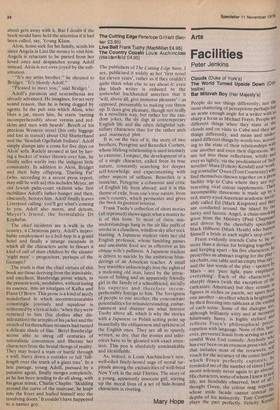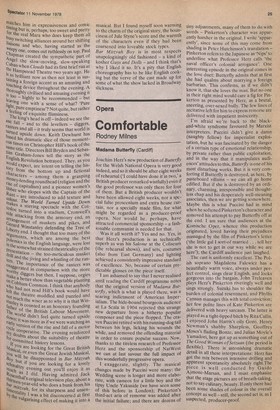Arts
Facilities
Peter Jenkins
Clouds (Duke of York's) The World Turned Upside Down (Get' tesloe) Bar Mitzvah Boy (Her Majesty's) People do see things differently; not the most shattering of perceptions perhaps but an acute enough angle for a writer with 85 sharp a focus as Michael Frayn. People see different things when they stare at the clouds and on visits to Cuba and they see things differently, and mean and under' stand different things by words too, accord' jug to the state of their relationships With one another and even their digestions. '61 are led into these reflections, wittily an" ever so lightly, via the predicament of `ladY novelist' Mara (Felicity Kendal) and `wort!' ing journalist' Owen (Tom Courtenay) vin° find themselves thrown together on a Press facility trip to Cuba where they are reP: resenting .rival colour supplements. The/: incompatible threesome is made up V.: red, starry-eyed American academic hie°, ably called Ed (Mark Kingston) and the) are conducted around the island by the lanky and laconic Angel, a chain-smol goon from the Ministry (Paul ChapInari,4 and driven by the cheerfully speeehle,.,black Hilbert° (Mark Heath) who barte`' himself a bride at each night's stop over' Frayn evidently intends Cuba to be 11° more than a device for bringing together and keeping apart — his five characters; h...` prescribes an abstract staging for the plaY, six chairs, one table and an empty blue sigsv and the last words of the play — spoken Mara — are 'pure light, pure emptine'f,' everything'. Each of the characters sharply drawn (with the exception Of th,s caricature American) but they remain 'ro figures in niches or panels, set apartfr° d one another — an effect which is heightenea by their freezing into tableaux at the ending' of each scene. Some of the dialogue Ncits' although brilliantly witty and at momen d hilariously funny, is highly stylised alic, reflects Frayn's philosophical Pre°,, cupation with language. None of this. in, ever, prevents Clouds from serving as a"' sto cessful West End comedy. Anybody vd has ever been on an overseas press visit, ar:0 that includes most of the reviewers' virs vouch for the accuracy of the comic horrobe which Frayn perfectly captures; ve reminded me of the number of times sworn solemnly never again to go ab1030 His characters, some of whom I knew In if, life, are fiendishly observed, best of thought Owen, the colour mag report`he whose snide facade cannot conceal to depths of his insincerity. Tom Courreticial plays the part perfectly. Felicity Ken matches him in expressiveness and comic timing but is, perhaps, too sweet and pretty for the real Mara who does keep them all busy switching alliances around her shifting liaisons and who, having started as the weepy one, comes out ruthlessly on top. Paul Chapman created the sympathetic part of Angel the slow-moving, slow-speaking Cuban when Clouds had its first brief run at the Hampstead Theatre two years ago. He IS as brilliant now as then not least in sustaining a foreign accent as an amusing and touching device throughout the evening. A thoroughly civilised and amusing evening it IS too _ highly to be recommended — but leaving one with a sense of what? 'Pure light, pure emptiness'? Not quite, but rather a feeling of exquisite flimsiness. The king's head is off —indeed we see the axe fall — and to the levellers — diggers, i ranters and all — it truly seems that world s turned upside down. Keith Dewhurst has based his dramatic slice of those momentous times on Christopher Hill's book of the Sirie title. Directors Bill Bryden and Sebastian Graham-Jones tell the story as the English Revolution betrayed. They, as you would expect, are intent on telling the history from the bottom up and fictional characters — among them a grasping Toney-lending roundhead (religion and the r.lse of capitalism) and a pioneer women s libber who elopes with the Captain of the Rant — are introduced to add texture and colour. The World Turned Upside Down .rnakes a stirring spectacle with the CotLe.sioe turned into a stadium, Cromwell 's Side attacking from the armoury end, an a_rrangement of muskets and pikes, and tiLerard Winstanley defending the Tree of iberty end. I thought that too many of the arguments, which are among the best P°Iemics in the English language, were lost in the somewhat strained theatricality of the Pdresentation — the too-meticulous musket niland the jiving and whistling of the ran lers. The importance of the ranters was `,._xaggerated in comparison with the more winorthy diggers but then, I suppose, orgies 0 ake a be t te r show than vegetable planting vvrobham Common. I think that anybody `P had not read Hill's book would have _en the theatre muddled and puzzled and s'°t much the wiser as to why it is that WinfaainleY is counted as an honorary founding he of the British Labour Movement. clue world didn't feel quite turned upside it was more as if we were watching an e rly version of the rise and fall of a motor jele cooperative. The evening reinforced doubts about the suitability of theatre "r, Committed history lessons. k,cif you are looking for the Great British ,7_11sleal, or even the Great Jewish Musical, -'1,_un will but be disappointed in Bar Mitzvah 4ctii num al tzyif you are looking for a lovely evening out you'll enjoy it as koch as I !ri did. Having admired jack Nisthars original television play, abouta bar Leen-year-old who does a bunk from his Li Prlitzvah, for its sharpness and unse nb7ntality I was a bit disconcerted at first j the vulgarising effect of making it into a musical. But I found myself soon warming to the charm of the original story, the bounciness of Jule Styne's score and the warmth of the characters even if they had been coarsened into loveable stock types. Bar Mitzvah Boy is in most respects unapologisingly old fashioned — a kind of kosher Guys and Dolls — and I think that's why I liked it so. It's a pity that English choreography has to be like English cooking but the verve of the cast made up for some of what the show lacked in Broadway slickness.



































 Previous page
Previous page